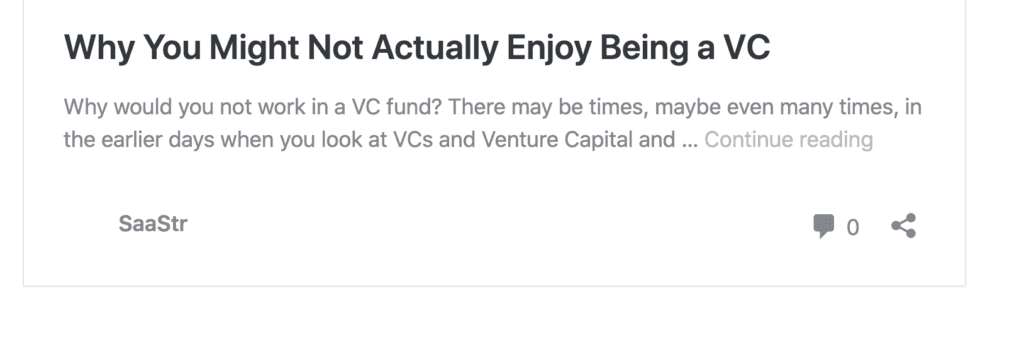Q: What are the pros and cons of working in the venture capital space, and why?
There are times as a founder when, if you are venture-backed, you’ll look at your VCs and just see … them working less hard, for a lot more money. And yet taking up a ton of space on the cap table. It won’t quite seem fair at times, and it will often seem somehow almost better. Easier.
Maybe. A few things to learn before you get jealous of your VCs::
- Venture Capital is a tiny industry. Tiny. It’s a tiny asset class, and most VC firms have just a handful of partners and a handful of additional investors.
- There are very limited promotion paths in venture. Yes, the largest and top firms promote a handful of folks to partner. But it’s just a handful of slots per year, really. Few firms really have a traditional partnership promotion path. Small partnerships just don’t need to add … too many new partners.
- It’s a sales and finance job. And you are just a number. Yes, VCs are much closer to founders than public market investors. But in the end, you are just a number — your returns. And to get strong returns, you have to hunt, find, and close top deals.
- Only the very best startups matter — in venture. It’s a bit of a sad thing, but in all but the smallest funds, only unicorn+ ($1B+ valuation) investments move the needle. There’s almost no point in investing in any startup that can’t be worth $1B+, at least potentially. Yet, so many amazing startups just won’t quite fit this narrow niche.
- It can take 15+ years or more to get real profits from your investments. VCs don’t take profits until they pay back their own investors first. Add to that the fact you may not share in any of the profits when you start in venture … well, it can be 15+ years until you really make any profits personally from your investments.
- It’s fiercely competitive. The best startups generally have far, far more investor interest than shares available. Why will you win? Do you know?
- The “boss” at a VC fund often takes a huge amount of the compensation. If you don’t run your own fund, you’ll often make far less from the investments than you might think. The math on how both fees and profits or carry are distributed is nuanced and complicated.
- Your VCs can be fired. Much easier than you can. There is more turnover in venture than you might realize. Usually only 1 or a few “managing” general partners run the place. They do fire other folks. Often slowly. But your job is often more at risk than being a CEO, and in many ways, less rewarding because you don’t really run the place.
- Partners often sort of can’t stand each other. This is surprisingly common. The partners at VC funds are often stuck with each other for decades by partnership documents.
- The cash comp is actually fairly poor in a tiny fund. Most VC funds keep about 2% of each fund each year for expenses. But if you raise, say a $30m run, that’s only $600k a year for all expenses. All salaries, rent, travel, trips, etc. If you have several partners, it doesn’t go all that far.
- Salaries are good in bigger funds and you can make real money on “carry” (investment profits) if you invest really well — but the best founders make much, much more. The best ones. The math here is nonobvious, but more here. Most VCs can’t really be founder/CEOs. But those that can, can make much more as a founder CEO.
So as you can see, the Pros and Cons of venture depend on … compared to what.
Compared to many “ordinary” jobs, it’s an amazing job. Compared to jobs where you can change the world directly … well, it’s more nuanced.
Whatever you do, don’t romanticize it.
A bit more here:
(note: an updated SaaStr Classic answer)


